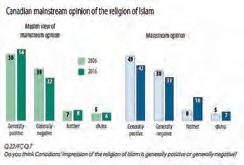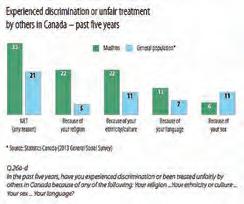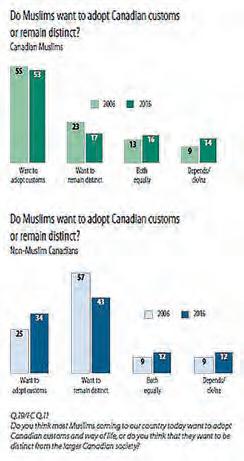
8 minute read
The Muslim Experience in Canada
The Muslim Experience in Canada Despite various challenges, a large majority of Muslim Canadians are proud of their national identity
BY KEITH NEUMAN
Advertisement
Until fairly recently, Muslims were just one of the many parts of Canada’s multicultural mosaic. The first recorded Muslim family arrived from Scotland in the early 1850s. Over the past two decades the Muslim population has grown dramatically, and by 2011 had passed the one million mark; Muslims now make up more than 3% of Canada’s population and represent one of the fastest growing religious groups.
The Muslim community has been a poorly understood religious minority in Western countries and in the past two decades, in the wake of 9/11 and certain unfamiliar religious practices (e.g., Sharia, the niqab), their presence has become contentious.
Canada has not experienced the ethnic violence and terrorist attacks as in other parts of the world, and by global standards, it is a welcoming multicultural society. But the Muslim community faces unique challenges with respect to religious freedom, acceptance by the broader society and national security profiling. In 2019, the Quebec government adopted legislation banning public workers in positions of “authority” from wearing religious symbols while they are on duty; a law, which effectively targets Muslim women who wear head and/or face coverings.
Much of the problem stems from the fact that Muslims are not well understood by other Canadians, whose impressions are formed largely through simplistic stereotypes emphasizing negative characteristics (violent extremism, honor killings). The result is a dominant narrative of Muslims as different from others and who resist the adoption of “Canadian values,” which makes them threatening and untrustworthy.
What is it like to be a Muslim in Canada, and what is it like for other Canadians to have Muslims living in their communities? In surveys conducted in 2006 and 2016, the nonprofit Environics Institute for Survey Research, in partnership with Muslims and non-Muslim organizations, addressed these questions. The research looked at how Muslims experience life in this country and how other Canadians view them (for details, see https://www.environicsinstitute.org/projects/ project-details/survey-of-muslims-in-canada-2016).
RESEARCH FINDINGS How well do Muslims feel accepted in Canada today?
Despitepervasive reporting of violence and terrorism abroad in the name of Islam, as well as stereotyping of religious and cultural practices in Canada, Muslims are more likely than not to feel their non-Muslim compatriots broadly accept their religion. A small majority believes that other Canadians have a generally positive impression of Islam and that relatively few non-Muslims are openly hostile to their community; this view has strengthened since 2006. In comparative terms, a large and growing majority of Muslim Canadians agrees that they are better treated than their coreligionists in other Western countries (84%, versus only 2% who believe they are treated worse). In fact, most non-Muslim Canadians surveyed are more positive than negative in their general impression of Islam, although such opinions have not measurably improved over the past decade.
CANADIAN MAINSTREAM OPINION OF THE RELIGION OF ISLAM
At the same time, discrimination and stereotyping continue to be a difficult reality for Muslim Canadians and is of particular concern to women and youth. One-third of Muslim Canadians have experienced discrimination in the past five years, due primarily to one’s religion or ethnicity. This is well above the levels of mistreatment experienced by the general population. Such negative experiences occur in a variety of settings, most commonly in the workplace, in public spaces, in retail establishments and in schools and universities. One in four Muslims has encountered difficulties crossing borders irrespective of gender, age and country of birth. Moreover, opinions about prospects for a better future are mixed, and it is Muslims under 35 who are the least optimistic.
How are religious identity and practice influenced by the Canadian context?
Canada is among the most secular of countries, which can present challenges for immigrants with non-Western religious traditions. Muslims are among the country’s most religiously observant groups, and their religious identity and practices appear to be strengthening as their lives evolve in Canada. Being Muslim is a very important part of the identity for most Muslims, and comparatively stronger than for members of other major religious groups in Canada.
Religious observance among Muslims has strengthened over the past decade. An increasing number are attending mosques for prayers on a regular basis (at least once a week) and (among women) are wearing the hijab. These trends are most noticeable among Muslims 18 to 34 years of age, in contrast with the broader trend in Canadian society where youth are turning away from organized religion.


FREQUENCY OF ATTENDING MOSQUE OR MUSLIM COMMUNITY CENTER FOR PRAYER
most Muslim Canadians support the right for individuals to pray in schools, and smaller majorities support the right for women to take the citizenship oath and/ or receive public services while wearing the niqab. Not all Muslims agree, however, and opposition to such rights is more evident among older Muslims. Non-Muslim Canadians are also more likely than not to support the right to prayer in schools and wearing the niqab in public, although opinions are more divided.
MISTREATMENT.
One area in which religious and cultural perspectives of Muslims differ from those of other Canadians pertains to family and sexuality. Muslims are noticeably more likely to value patriarchy (“the father must be the master in the home”) and to reject homosexuality. Second-generation Muslims are closer to the Canadian majority perspective (particularly in rejecting patriarchy), suggesting that Muslim values may move into closer alignment with the rest of the population over time.
Do Muslims feel attached
to Canada? As a population made up mostly of immigrants (many having arrived in the past decade), Muslims are among the most enthusiastic group of Canadian patriots. More than eight in ten are very proud to be Canadian (more so than their non-Muslim compatriots) and this sentiment has strengthened over the past decade, especially in Quebec. Strong religious identity notwithstanding, Muslims are as likely as others in this country to say their Canadian identity is very important. And they agree with other Canadians on what makes Canada a great country: its freedom and democracy, and its multicultural diversity. Their greatest dislike, not surprisingly, is the cold climate. Muslim Canadians increasingly express a strong sense of
THE OVERALL PICTURE PAINTED BY THIS RESEARCH OFFERS A STARK CONTRAST WITH THE STEREOTYPED IMAGES THAT OFTEN FORM THE BASIS FOR BROADER PUBLIC OPINION. THE RESULTS PORTRAY A SMALL BUT GROWING PART OF THE COUNTRY’S DIVERSE POPULATION THAT IS EMBRACING CANADA’S DIVERSITY, DEMOCRACY AND FREEDOMS IN THE FACE OF CONTINUING CONTROVERSY AND
belonging to the country, and one manifestation is a high level of participation in the 2015 federal election, in which multiculturalism and immigration became political flashpoints. They also stand out as being upbeat about the direction of the country overall: in 2016, nine in ten said it is moving in the right direction, a 10 point increase since 2006 and in contrast to declining confidence expressed by other Canadians. Notably, negative experiences with discrimination have not measurably sullied individuals’ sense of connection with the country and what it stands for. Because Muslims have a religion and cultural backgrounds unfamiliar to most o ther Canadians, they face questions about their commitment to becoming part of Canadian society. This research demonstrates this to be largely a misconception: A majority of Muslims say their community wants to integrate into broader society rather than remain distinct, and this view has strengthened over time. And non-Muslims are increasingly coming to recognize this, as fewer now believe than a decade ago that Muslims in this country prefer not to integrate.
DO MUSLIMS WANT TO ADOPT CANADIAN CUSTOMS OR REMAIN DISTINCT?

More importantly, Muslims are as likely as non-Muslims to support diversity and connections between cultures. And they agree with other Canadians about the values that all immigrants should adopt when settling in Canada – language fluency, tolerance and respect for others and different cultures, appreciation of Canadian history and respect for the law.
Arguably the greatest concern among non-Muslims is the perceived threat of domestic terrorism emanating from extremist Islamic ideology. This is also of great concern to Muslim Canadians, who take the threat of radicalization to violence very seriously given the impact extremist Islamic movements can have on their own communities. Muslims in Canada believe that very few among them support the violent extremists abroad, and this view has strengthened over time. The vast majority place great importance on community cooperation with government agencies to address radicalization, and most are generally comfortable with the powers currently granted to the country’s security agencies, although there is clear discomfort with provisions in the Bill C-51 (The Anti-terrorism Act, 2015; https://www.parl. ca/DocumentViewer/en/41-2/ bill/C-51/royal-assent).
The overall picture painted by this research offers a stark contrast with the stereotyped images that often form the basis for broader public opinion. The results portray a small but growing part of the country’s diverse population that is embracing Canada’s diversity, democracy and freedoms in the face of continuing controversy and mistreatment.
Such research is essential to creating an accurate picture of the country’s Muslim community in a way that is systematic, credible and media friendly. The insights gained can test and debunk myths, provide a constructive narrative and help break down barriers between different parts of society that are built on ignorance and fear. Media, opinion leaders, employers and organizations can use these findings to educate and build awareness that will have long-term benefits for Muslim and non-Muslims alike.
Plans are now underway to update this research in 2021 Contact info@environicsinstitute.org for more information. ih
Keith Neuman, senior associate with the Environics Institute for Survey Research, has directed numerous ground breaking studies on such topics as immigration and diversity, social capital and Indigenous issues.








